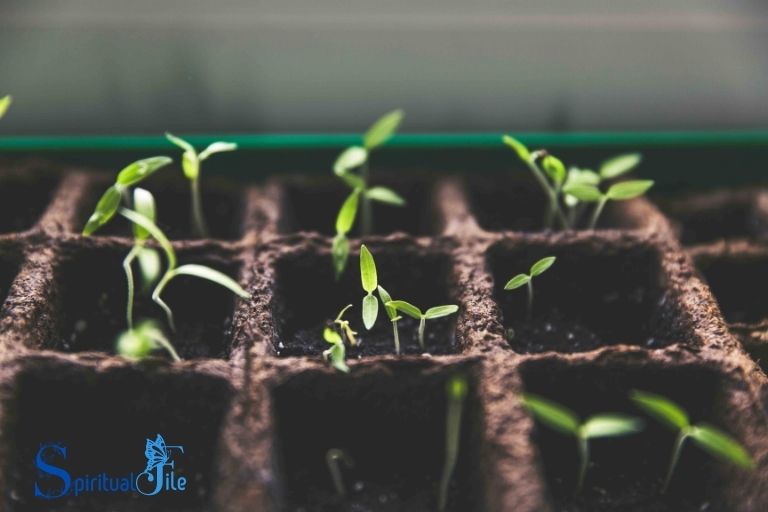Spiritual Development Definition And Examples: Evolving!
Spiritual development refers to the process of evolving your inner self, your consciousness, and your understanding of life’s greater meaning.
It is a journey towards self-awareness and enlightenment, involving practices that often include meditation, prayer, mindfulness, and yoga.
Examples of spiritual development include discovering a sense of purpose, developing a deeper connection with others or nature, and cultivating inner peace and harmony.
Spiritual development is not linked to any particular religious belief or practice. It is a personal journey that varies greatly from person to person, depending on their unique experiences, beliefs, and aspirations.

Key Takeaway
Understanding Spiritual Development
Spiritual development refers to the growth of an individual’s inner self, connecting with their spirituality, and finding meaning and purpose in life.
Examples include engaging in mindfulness practices, exploring different religious beliefs, and deepening one’s connection with nature.
What Is Spiritual Development?
- Spiritual development refers to the process of seeking and nurturing a deeper connection with one’s inner self and the higher power or divine source.
- It involves exploring and expanding one’s understanding of spirituality, and it is based on the belief that there is a greater purpose and meaning to life.
- Spiritual development involves cultivating qualities such as self-awareness, inner peace, compassion, gratitude, and a sense of interconnectedness with all beings and the universe.
Why Is Spiritual Development Important?
- Spiritual development plays a vital role in fostering overall well-being, personal growth, and inner fulfillment.
- It provides a sense of purpose and meaning in life, aiding individuals in navigating challenges, finding inner strength, and maintaining emotional resilience.
- Engaging in spiritual practices allows individuals to connect with their core values and align their actions with their beliefs, leading to a more authentic and fulfilling life.
The Connection Between Spirituality And Personal Growth:
- Spirituality and personal growth are interconnected, as both involve the exploration and evolution of the self.
- Spiritual development encourages individuals to reflect on their thoughts, emotions, and behaviors, fostering self-awareness and self-discovery.
- It provides a framework for personal growth by promoting self-reflection, introspection, and the development of virtues such as patience, forgiveness, and empathy.
- Spiritual practices, such as meditation, mindfulness, prayer, and reflection, serve as tools to cultivate personal growth and enhance one’s overall well-being.
Remember, spiritual development is a lifelong journey, unique to each individual. By nurturing and nourishing our spiritual selves, we can cultivate a deeper sense of purpose, inner peace, and personal growth.
Exploring Different Dimensions Of Spirituality
Discover the diverse dimensions of spirituality and explore spiritual development through a variety of definitions and real-life examples. Gain a deeper understanding of the transformative journey towards inner growth and self-discovery.
Emotional Intelligence And Its Role In Spiritual Development
- Emotional intelligence is a key aspect of spiritual development, emphasizing the ability to recognize, understand, and manage our own emotions and the emotions of others.
- By cultivating emotional intelligence, individuals can enhance their spiritual growth and build deeper connections with themselves and those around them.
- Understanding and managing emotions allows individuals to navigate challenges, build resilience, and foster compassion, empathy, and kindness.
- Developing emotional intelligence involves honing skills such as self-awareness, self-regulation, empathy, and effective communication.
- Through emotional intelligence, individuals can cultivate a sense of peace, balance, and harmony within themselves, facilitating spiritual development.
Cultivating Mindfulness And Self-Awareness
- Mindfulness is a practice that encompasses being fully present in the moment, non-judgmentally observing one’s thoughts, emotions, and sensations.
- By cultivating mindfulness, individuals gain a deeper understanding of themselves and the world around them, fostering self-awareness and spiritual growth.
- Mindfulness helps individuals break free from automatic patterns of thought and behavior, allowing them to respond to situations with greater clarity and intention.
- Practicing mindfulness encourages an appreciation for the present moment and cultivates gratitude, leading to a heightened sense of spirituality.
- Mindfulness can be cultivated through various practices, such as meditation, breath awareness, body scans, and mindful movement.
Embarking On Reflective Practices For Spiritual Growth
- Reflective practices involve introspection and self-examination, enabling individuals to explore their values, beliefs, and experiences on a deeper level.
- Engaging in reflective practices promotes personal growth, self-discovery, and spiritual development.
- Journaling, writing, or engaging in meaningful conversations can provide opportunities for reflection and self-exploration.
- Reflective practices encourage individuals to question their assumptions, examine their thoughts and emotions, and gain insight into their actions and behaviors.
- By engaging in reflective practices, individuals can gain clarity, enhance self-understanding, and pursue a path of spiritual growth.
Exploring different dimensions of spirituality involves acknowledging the role of emotional intelligence in spiritual development, practicing mindfulness and self-awareness, and embarking on reflective practices for personal and spiritual growth.
These dimensions provide individuals with pathways to deepen their spiritual connection, foster inner peace, and lead a more meaningful life.
Examples Of Spiritual Development
Spiritual development refers to the process of nurturing and deepening one’s spiritual beliefs and connection. Examples of spiritual development include meditation, prayer, mindfulness practices, and engaging in acts of kindness and compassion towards others.
Developing A Regular Meditation Practice:
- Regular meditation practice is a powerful way to enhance spiritual development and cultivate inner peace.
- Meditating for just a few minutes a day can provide profound benefits for the mind, body, and spirit.
- By sitting in stillness and focusing on the breath, meditation helps calm the mind, reduce stress, and increase self-awareness.
- This practice allows individuals to connect with their deeper selves, gain clarity, and tap into a sense of inner wisdom.
- Consistency is key when developing a meditation practice, so it is recommended to set aside a specific time each day to meditate.
- Starting with shorter sessions and gradually increasing the duration can help maintain motivation and establish a routine.
- There are various types of meditation to explore, such as mindfulness meditation, loving-kindness meditation, and transcendental meditation.
- Regardless of the technique chosen, the goal remains the same – to quiet the mind, cultivate mindfulness, and foster spiritual growth.
Engaging In Acts Of Kindness And Compassion:
- Acts of kindness and compassion are fundamental to spiritual development and have a profound impact on both the giver and the receiver.
- Engaging in acts of kindness can range from small, everyday gestures to grand acts of generosity.
- Simple acts like offering a smile, lending a helping hand, or expressing gratitude can foster a sense of connection and facilitate spiritual growth.
- Compassionate actions extend beyond individuals and can include participating in charitable initiatives or volunteering for causes close to one’s heart.
- By selflessly giving to others, individuals tap into their innate capacity for love, empathy, and understanding.
- Acts of kindness and compassion not only bring joy and fulfillment but also contribute to a more compassionate and interconnected world.
- Cultivating kindness can be as simple as intentionally practicing empathy, forgiveness, and non-judgment in daily interactions.
Nurturing Meaningful Connections And Relationships:
- Meaningful connections and relationships play a vital role in spiritual development, providing a sense of belonging and support.
- While quantity is not as important as quality, nurturing a few deep connections can have a transformative effect on one’s spiritual journey.
- Meaningful relationships are built on trust, mutual respect, empathy, and open communication.
- Cultivating these qualities allows individuals to connect on a deeper level and establish authentic connections.
- Spending quality time with loved ones and engaging in meaningful conversations promotes spiritual growth.
- Surrounding oneself with individuals who share similar values and aspirations can provide inspiration and motivate personal development.
- Prioritizing relationships also involves setting healthy boundaries, showing appreciation, and being present during interactions.
- By nourishing these connections, individuals can experience a sense of purpose, belonging, and fulfillment in their spiritual journey.
Conclusion
In a fast-paced world, where stress and anxiety are prevalent, it is essential to prioritize our spiritual development.
Cultivating a deeper connection with ourselves and the universe can lead to a sense of peace, purpose, and fulfillment.
Spiritual development is a journey that varies for each individual, but it involves practices such as meditation, mindfulness, self-reflection, and gratitude.
These practices help us tap into our inner wisdom and intuition, allowing us to navigate life’s challenges with clarity and resilience.
By embracing this journey, we can uncover our true potential and live a more authentic and meaningful life.





